#Mohammed El-Kurd
Text
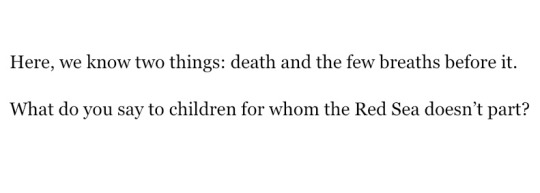
Rifqa, Mohammed El-Kurd
#quotes#poetry#quote#poem#Mohammed el-Kurd#id in alt text#this is from no moses in siege!! INCREDIBLE poem
706 notes
·
View notes
Text

Mohammed El-Kurd, from Rifqa; “Born on Nakba Day”
[Text ID: “Birth lasts longer than death. / In Palestine death is sudden, / instant, / constant, / happens in between breaths.”]
#mohammed el-kurd#palestine#free palestine#war#trauma#loss#death#excerpts#gazagenocide#writings#literature#poetry#fragments#selections#words#quotes#poetry collection#typography
752 notes
·
View notes
Text
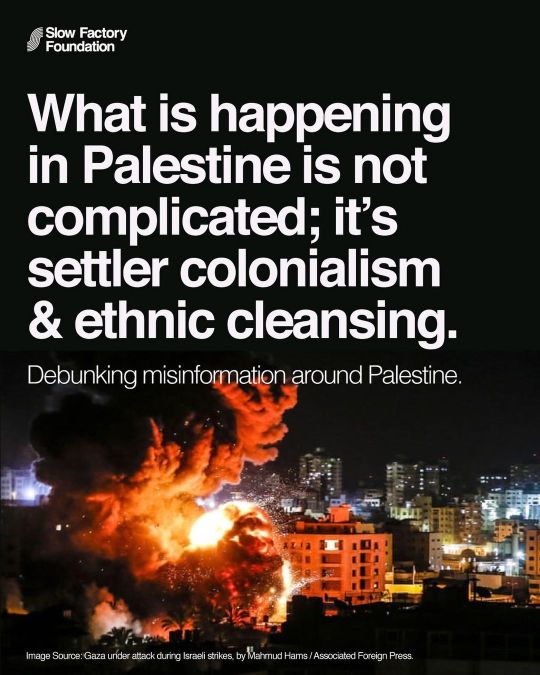

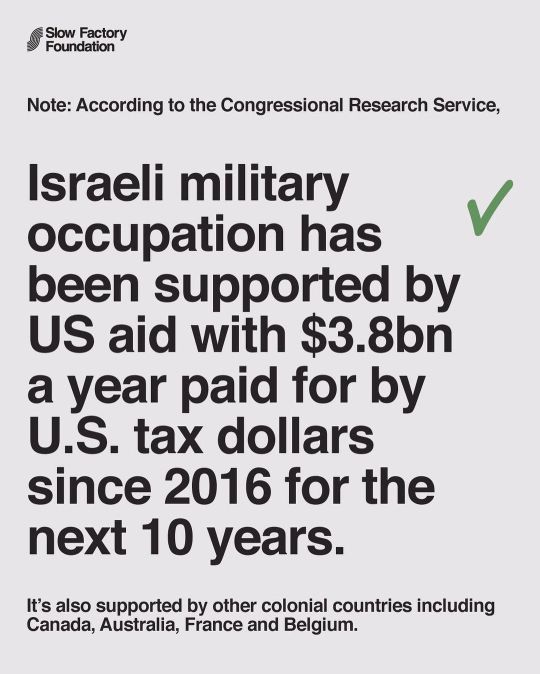
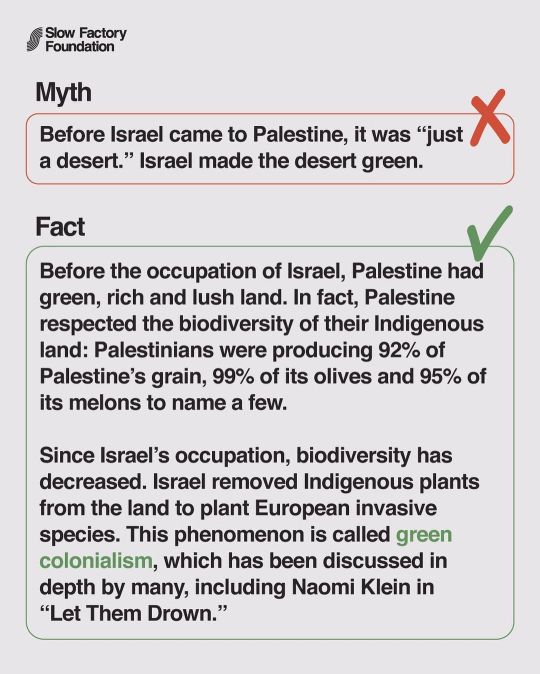
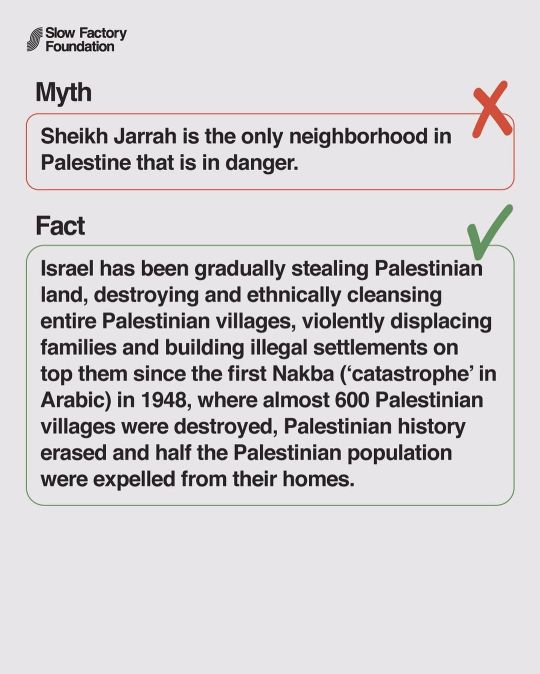
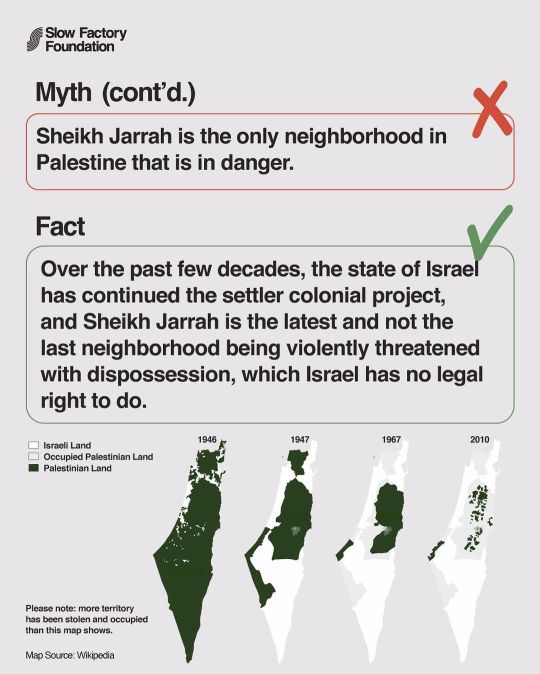
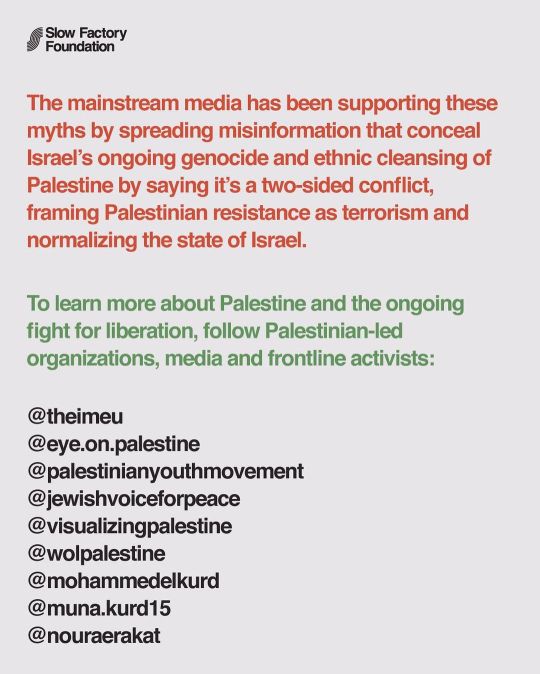
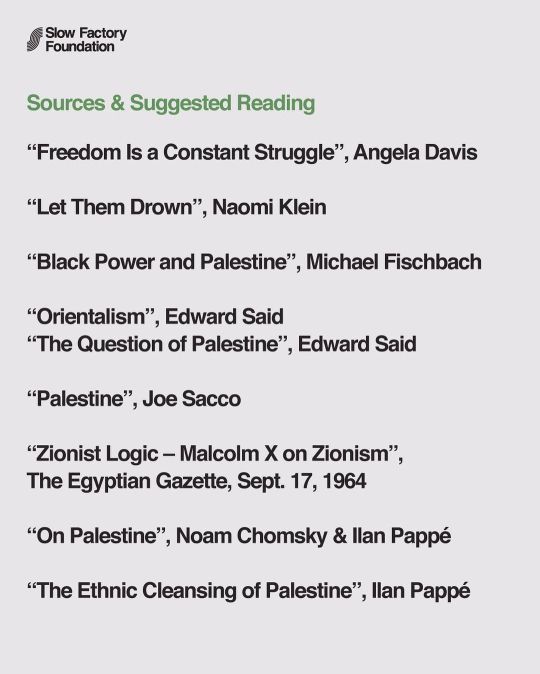
[This post is a series of images from an infographic by the Slow Factory Foundation originally posted May 2021. The first image is a photo with text over it. The photo shows a massive fireball in the middle of a group of buildings, with a massive black cloud rising from the flames that is bigger than the buildings themselves. The building just behind the fireball is low, rectangular, and lit up bright orange. Behind that building, there is a city lit up at night. Hundreds of buildings stretching into the distance, a thousand glimmering lights.]
What is happening in Palestine is not complicated; it's settler colonialism & ethnic cleansing.
Debunking Misinformation around Palestine.
Myth ❌
Palestine and Israel are in "conflict."
Fact ✅
What is happening in Palestine is settler colonialism, military occupation, land theft and ethnic cleansing. A conflict means there is equal footing, which is not the case. There is an active oppressor (Israel) and an oppressed (Palestine). A colonizer (Israel) and a colonized (Palestine). This is not a conflict.
[Three images of headlines with the word 'conflict' crossed out in red ink.]
Note: According to the Congressional Research Service,
Israeli military occupation has been supported by US aid with $3.8bn a year paid for by U.S. tax dollars since 2016 for the next 10 years.
It's also supported by other colonial countries including Canada, Australia, France and Belgium.
Myth ❌
Before Israel came to Palestine, it was "just a desert" and Israel made the desert green.
Fact ✅
Before the occupation of Israel, Palestine had green, rich and lush land. In fact, Palestine respected the biodiversity of their Indigenous land: Palestinians were producing 92% of Palestine's grain, 99% of its olives and 95% of its melons to name a few.
Since Israel's occupation, biodiversity has decreased. Israel removed Indigenous plants from the land to plant European Invasive species. This phenomenon is called green colonialism, which has been discussed in depth by many, including Naomi Klein in "Let Them Drown."
Myth ❌
Sheikh Jarrah is the only neighborhood in Palestine that is in danger.
Fact ✅
Israel has been gradually stealing Palestinian land, destroying and ethnically cleansing entire Palestinian villages, violently displacing families and building illegal settlements on top them since the first Nakba ('catastrophe' in Arabic) in 1948, where almost 600 Palestinian villages were destroyed, Palestinian history erased and half the Palestinian population were expelled from their homes.
Myth (cont'd.) ❌
Sheikh Jarrah is the only neighborhood in Palestine that is in danger.
Fact ✅
Over the past few decades, the state of Israel has continued the settler colonial project, and Sheikh Jarrah is the latest and not the last neighborhood being violently threatened with dispossession, which Israel has no legal right to do.
[Images of a map showing the drastic decrease in Palestinian landmass from 1946 to 2019. In 1946, Palestine was 99% Palestinian land. In 1947, it decreased to 40%. In 1967, to 30%. And in 2019, less than 20% of Palestine is Palestinian land. The remaining areas are being encroached on by occupied Palestinian land, meaning occupied by Israelis. The rest is Israeli land.]
The mainstream media has been supporting these myths by spreading misinformation that conceal Israel's ongoing genocide and ethnic cleansing of Palestine by saying it's a two-sided conflict, framing Palestinian resistance as terrorism and normalizing the state of Israel.
To learn more about Palestine and the ongoing fight for liberation, follow Palestinian-led organizations, media and frontline activists. [@Instagram / Facebook]
@theimeu / Institute for Middle East Understanding ( IMEU )
@eye.on.palestine
@palestinianyouthmovement / Palestinian Youth Movement (PYM)- حركة الشباب الفلسطيني
@jewishvoiceforpeace / Jewish Voice for Peace
@visualizing_palestine / Visualizing Palestine
@wolpalestine [Censored by Meta]
@mohammedelkurd / Mohammed El-Kurd
@muna.elkurd15 / Muna Nabeel Elkurd
@nouraerakat / Noura Erakat
Sources & Suggested Reading
Freedom is a Constant Struggle by Angela Davis
Let Them Drown by Naomi Klein
Black Power and Palestine by Michael Fischbach
Orientalism by Edward Said
The Question of Palestine by Edward Said
Palestine by Joe Sacco
"Zionist Logic — Malcolm X on Zionism" in The Egyptian Gazette, Sept. 17, 1964
On Palestine by Noam Chomsky and Ilan Pappé
The Ethnic Cleansing of Palestine by Ilan Pappé
[End of images]
#the slow factory#palestine#gaza#angela davis#naomi klein#michael fischbach#edward said#joe sacco#malcolm x#noam chomsky#ilan pappé#Noura Erakat#Muna Nabeel Elkurd#Mohammed El-Kurd#Eye On Palestine#IMEU#Palestinian Youth Movement#Jewish Voice for peace#Visualizing Palestine
171 notes
·
View notes
Text
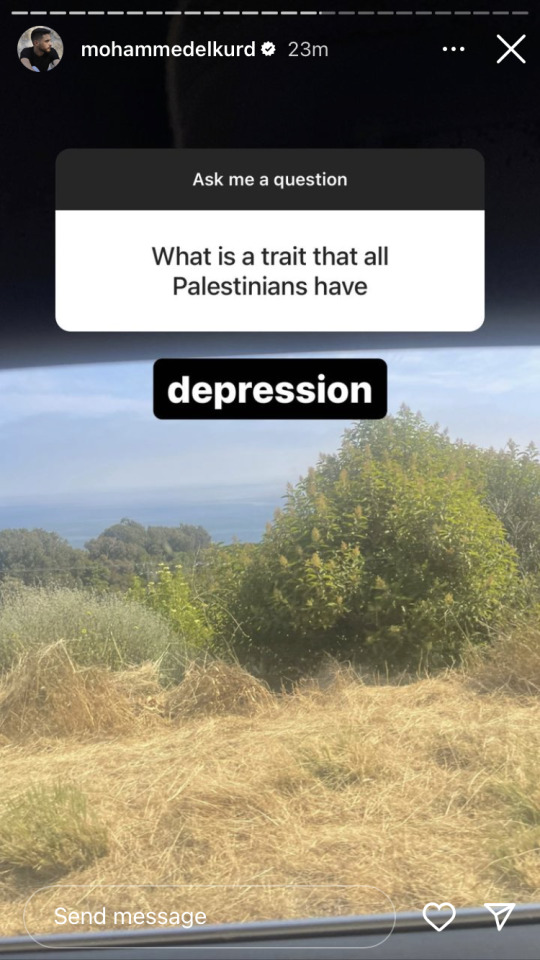
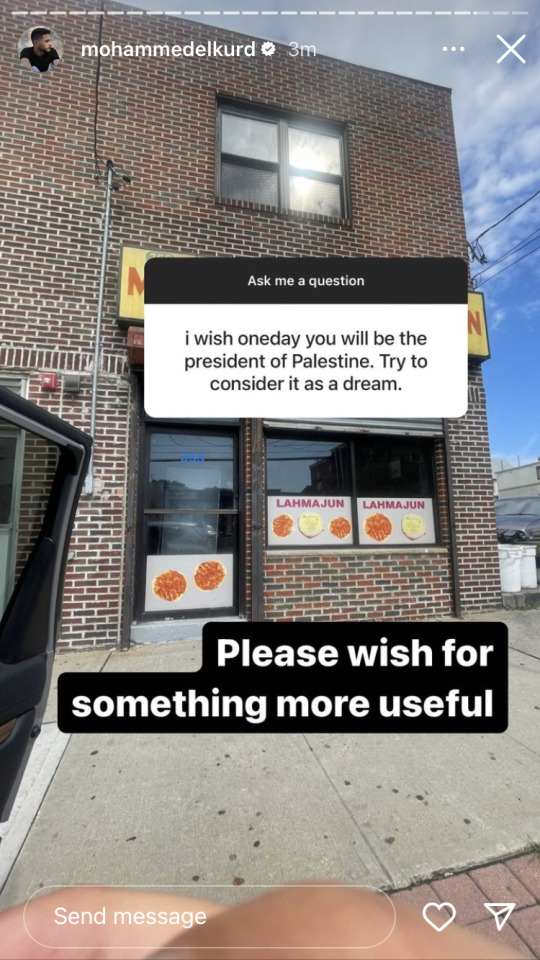
mohammed el-kurd is genuinely one of the funniest people ever and he talks abt this idea during his saïd memorial lecture that humor is a way into people's hearts to help them understand these otherwise unapproachable uncomfortable topics and. I really admire his wit and sharp words
273 notes
·
View notes
Text
https://mondoweiss.net/2024/03/are-we-indeed-all-palestinians/
"Whether that is true—that ‘the people united will never be defeated’—is yet to be seen. What is true, unnervingly, undoubtedly, is that our conundrum is not about victory or defeat, rather, it is about the simple fact that there is no excuse for us to hide in our safe silences while our siblings are slaughtered.
How bitter, how shameful is survival if won only in solitude?
It is tempting, almost comforting—particularly as I look at the food on my table and the roof over my head—to indulge in guilt, but it is an unproductive sentiment, it does not start revolutions. Guilt imposes itself like a nagging cavity, you are acutely aware of its presence, but you continue to shovel the same sweets in your mouth, until your teeth rot, until you self-destruct.
These days I am haunted by a subtler, though deadlier, refrain, an unwanted realization: Gaza has the right to forsake us, to never forgive us, to spit in our faces. How many wars has it confronted? How many martyrs has it given? How many bodies were stolen from it, snatched from their fathers’ embrace? And how many of us stutter when asked about resistance, or disavow our right to resist entirely, our need to resist? How many of us choose our careers over our kin? How many of us could have done something, anything, but did not?
Perhaps we are simply afraid. Fear is all around us. It has infested newsrooms and campuses and invaded our apartments and places of worship. It has turned thunderous declarations into anonymous whispers. Those of us who stand with ‘the children of darkness’ will be blackmailed and blacklisted. ‘Either you are with us or with the terrorists,’ bosses and world leaders say to those who listen, planting fear in their hearts.
Do those anxieties constitute a real psychological condition, or are they the aftermath of a successful fear-mongering policy meant to stifle the masses? What is that fear, anyway, compared to the fear of dying of starvation, of being flattened under a military tank, of being suffocated under the rubble, of being the lone survivor of your family, of your heart breaking for the millionth time?
What is that fear if not theater?
I hear the phrase we must honor our martyrs, but what does it look like to truly honor them? Witnessing, whatever that may mean, is not enough, at least not on its own. Nor is it enough to honor them with discursive lullabies and empty, pseudo-radical slogans.
The rallying cry that we are all Palestinians must abandon the metaphor and manifest materially. Meaning, all of us—Palestinians or otherwise—must embody the Palestinian condition, the condition of resistance and refusal, in the lives we lead and the company we keep. Meaning we reject our complicity in this bloodshed and our inertia when confronted with all of that blood. Because Gaza cannot stand alone in sacrifice."
50 notes
·
View notes
Text
The Palestinian People have consistently made it crystal clear that our enemy is the colonialist and racist ideology of Zionism, not Jews. Our capacity to produce such distinction is admirable and impressive, considering the heavy-handedness with which Zionism attempts to synonymize itself with Judaism.
However, this distinction isn’t our responsibility, and personally, it isn’t my priority. A Palestinian’s perceived resentment doesn’t have the backing of a Knesset to codify it into law. Tropes aren’t drones, nor can one convert conspiracy theories into nuclear weapons. We are past the early 1900s. Things are different, power has shifted. Words are not murder.
In the days between the 16 soldiers branding a man’s face with the Star of David and the release of the joint letter, an Israeli soldier killed a disabled teenager near a military checkpoint in Qalqilya; another shot a child in the head in Silwan; a young man previously shot in an Israeli raid of the Balata refugee camp died of his injuries; a sniper shot a Palestinian youth in the head in Beita; a 17-year-old was shot and killed south of Jenin; one more young man succumbed to his wounds following a invasion of the refugee camp; families of Palestinians whose corpses are held by the Occupation authorities marched with empty caskets in Nablus; a soldier killed a man near Hebron, police executed a 14-year-old boy in Sheikh Jarrah to the applause of hundreds of settlers; the police then tear-gassed his family in Beit Hanina; a Palestinian was killed after ramming Israeli soldiers in Beit Sira, killing one; in the north of Jericho, a Palestinian man was killed and a soldier was injured in a gunfire exchange; a soldier shot a man in the head in Tubas, killing him—and this is only the very tip of the iceberg.
Which of these caused a far-reaching debate? None. There was a lot of noise concerning Itamar Ben-Gvir stating that Jewish life is “more important than [Palestinian] freedom” on television, a lot less noise about the carving of the Star of David, and, of course, Mahmoud Abbas received the noisiest reaction of all. (This is true in general, not just in the case of the open letter).
All three of those examples deal with aesthetics. Ben-Gvir’s statements were factual and true: Jewish life is worth more than ours under Israeli rule, but it was his explicit oration that triggered outrage rather than the institutionalized policies that have made his racist remarks the material reality on the ground. Even the physical deformation of a Palestinian’s face was only of note because of what the etching symbolized, not the etching itself—had the soldiers cut inconspicuous lines on his cheek, I doubt it would have garnered any attention at all.
As for Palestinian death, it is quotidian and negligible. If we’re lucky, our martyrs are communicated in sums on the pages of end-of-year reports. “Revisionism” on the other hand, warrants a cacophony of condemnation.
48 notes
·
View notes
Text
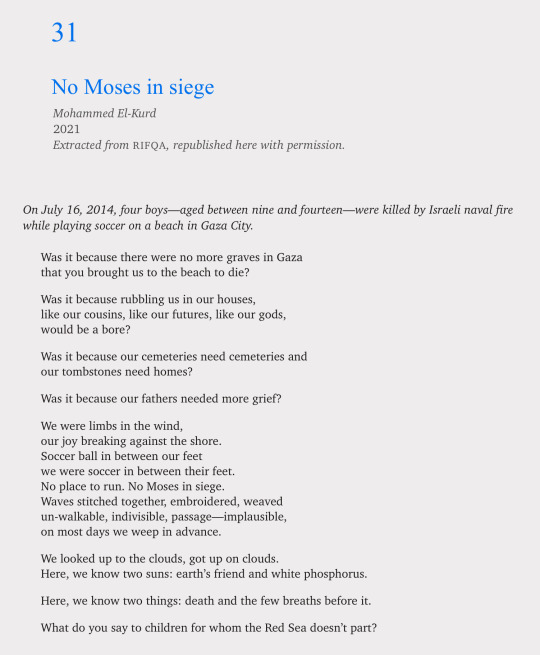
No Moses in siege (2021) by Mohammed El-Kurd; From the River to the Sea: Essays for a free Palestine
"On July 16, 2014, four boys - aged between nine and fourteen - were killed by Israeli naval fire while playing soccer on a beach in Gaza City."
Was it because there were no more graves in Gaza
that you brought us to the beach to die?
Was it because rubbling us in our houses,
like our cousins, like our futures, like our gods,
would be a bore?
Was it because our cemeteries need cemeteries and
our tombstones need homes?
Was it because our fathers needed more grief?
We were limbs in the wind,
our joy breaking against the shore.
Soccer ball in between our feet
we were soccer in between their feet.
No place to run. No Moses in siege.
Waves stitched together, embroidered, weaved
un-walkable, indivisible, passage - implausible,
on most days we weep in advance.
We looked up to the clouds, got up on clouds.
Here, we know two suns: earth's friend and white phosphorus.
Here, we know two things: death and the few breaths before it.
What do you say to children for whom the Red Sea doesn't part?
18 notes
·
View notes
Note
I was morbidly curious what… insightful and completely accurate I'm sure commentary Mohammed El-Kurd would have to say on what been happening right now. A perusal of his Twitter feed was a string of calling the IDF's evacuation orders of Gazan civilians "ethnic cleansing" and accusing Israel of "genocide" in general (no surprises there). Also not at all surprising but still appalling was his denial Hamas's infanticide and accusing the (((media))) of lying to "justify Israeli war crimes."
One of the things that stood out to me was something that he retweeted: "unspeakable horrors being committed in your name and you, a white american jew, are the one fearing for your life here? and, we are supposed to pretend like this is a legitimate grievance and we are not being punk'd? okay"
I'll leave aside the denial of the severe rise in antisemitism worldwide and the loaded characterization of Jews as white because that's old hat for anti-zionists. Here's the thing to me: I recognize that there exist Palestinians who do not condone Hamas and their terrorism. That being said, if I were Palestinian, I would not be mouthing off about "unspeakable horrors being committed in your name" right now.
During the time I spent as an anti-Zionist Jew (which I left awhile ago due to endemic, severe antisemitism that was still just barely beneath surface at the time), I distinctly remember Palestinians (and others, especially anti-Zionist Jews) constantly chastising Diaspora Jews, including anti- and non-Zionist ones, for "Israeli crimes done in [our] name." Never, in a million years, was it considered acceptable to even think about turnabout on Palestinians for the genocidal antisemitism of Palestinian terrorism. Hell, it wasn't really acceptable to identify the genocidally antisemitic terrorism in the first place because that was "telling Palestinians how to resist," and it was pretty much "racist" to ever accuse a Palestinian of antisemitism.
None of the response I've seen is surprising, and that honestly makes me even angrier.
I am glad you got out of that circumstance without being stalked or harmed. Whenever anti-Zionist Jews finally say something has gone too far, they can very quickly find out just how much their "allies" were just using them (i.e. JVP saying they wouldn't work with Alison Weir, or Peter Beinart saying not to boycott an Israeli food truck).
28 notes
·
View notes
Text
The Anti-Defamation League has called Mohammed El-Kurd an “unvarnished, vicious antisemite.” Yet in spite of widely available evidence attesting to his prominence as a hatemonger, Mount Royal University in Canada chose to award the writer with the 2023 Calgary Peace Prize.
Now the International Legal Forum (ILF) has sent a letter urging the reversal of this decision.
It said: “His past statements go above and beyond any acceptable criticism of Israel, principles of free speech or the advancement of Palestinian rights. Instead, they represent an unhinged display of bigotry, use of antisemitic tropes and both the incitement and glorification of violence.”
ILF further pointed out how El-Kurd’s statements violated the International Holocaust Remembrance Alliance’s (IHRA) working definition of antisemitism.
Some of the statements El-Kurd has made over the years include calling Zionists “sadistic barbaric neo-Nazi pigs” who have “completely internalized the ways of the Nazis.” He also said that he fantasized about this fate: “I hope every one of them dies in the most torturous & slow ways. I hope that they see their mothers suffering.”
El-Kurd is a Palestinian writer and poet based out of Sheik Jarrah in eastern Jerusalem.
According to the Calgary Peace Prize site, in 2021, He was named one of the 100 most influential people in the world by TIME magazine.
20 notes
·
View notes
Text

Rifqa, Mohammed El-Kurd
215 notes
·
View notes
Text
6 notes
·
View notes
Text

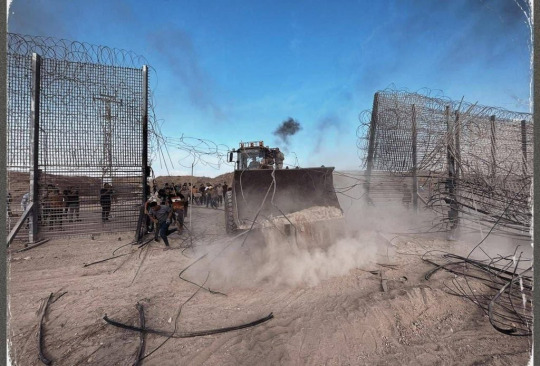
BULLDOZERS UNDOING GOD by mohammed el-kurd (RIFQA 2021) / opening of the erez military checkpoint at the gaza strip (2023)
11 notes
·
View notes
Text
Mohammed El-Kurd in the Nation, the Edward Said memorial lecture.
I want to touch on one more thing. When I go onstage, I usually joke a lot. I joke on purpose, first of all because I want to believe I’m funny. But there’s another reason: Any Palestinians operating in the public eye, especially Palestinians who have suffered Israeli violence, are expected to behave a certain way. You are supposed to be miserable—head bowed, wailing and weak and asking for mercy. You’re supposed to be polite in your suffering. And I completely refuse this. I refuse these politics of appeal. I don’t want to appeal to anyone. I can experience travesty and tragedy, and profound loss, and I can still make a joke about it. And that is the full spectrum of Palestinian humanity—or human humanity at large. We are human not just because we cry when we lose our mothers, or when we lose our homes, or because we have pets or hobbies. We are humans because we feel rage and we feel disdain—because we resist.
6 notes
·
View notes
Text
What does it mean to practice a politics of appeal? For decades, well-meaning journalists and cultural workers used a humanizing framework in their representation of oppressed people in hopes of countering the traditional portrayal of the Palestinian as a terrorist. Not only did this produce a false, flattening dichotomy between terrorists and victims, but the victimhood that emerges within this framework is a perfect victimhood, an ethnocentric requirement for sympathy and solidarity.
We often overemphasize an oppressed person’s nonviolence, noble profession, disabilities; we ring them with accolades. And we do this not only in the Palestinian context, but also with regard to Black American victims of police brutality: “They were artists” or “They were mentally ill” or “They were unarmed.” It’s as if condemning the state for sanctioning the death of a Black person is permissible only if the slain person is a sterile model of American citizenry. One could say the same about sexual assault victims: We must remind the listener that the victim was sober and dressed appropriately.
5 notes
·
View notes
